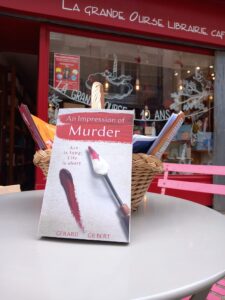News

A BESTSELLER IN DIEPPE!
I’m very happy to say that my novel set in Dieppe is selling well in Dieppe! The excellent La Grande Ourse bookshop has an English language section and I’ve been asked to restock An Impression of Murder three times now. A new fourth delivery arriving this weekend
I wrote about my experience of self-publishing for the iPaper
I self-published my novel. That doesn’t mean it’s bad
Bill Bryson shouldn’t knock it – it’s a great way to for authors to reach readers, sometimes in their thousands. Full feature (and unflattering headshot) here
I wrote about An Impression of Murder for our splendid local magazine here in Lewes, Sussex – The Lewesian (taking a local angle obviously, but if you ever get the chance to take the Newhaven-Dieppe ferry, it’s well worth the four-hour crossing)…

A hugely enjoyable book launch and signing for An Impression of Murder at Waterstones in Lewes. The ‘home crowd’ were receptive to the Dieppe setting, many of them having regularly visited the lovely French port.
The act of reading a passage aloud was a salutary lesson in editing – I must do this more often (in fact, all of the time) with my next book.
First, however, was the tricky decision of which passage to read. Being a thriller, I didn’t want to give away any important plot points – ‘spoilers’ as they say in TV-land. At the same time, some of the background material might not have been gripping enough for a short taster. In the event a read a short passage that illustrated Oscar Wilde’s reception after arriving in Dieppe following his release from prison in England.
The English colony in Dieppe were uniformly hostile to Wilde’s presence among them. They would turn their backs on him in the street and walk out of restaurants and cafes when he entered. In fact the only Englishman who didn’t treat Wilde in this fashion was a private detective hired by the great writer’s nemesis, the Marquis of Queensbury. At any rate, that’s what happens in my fictionalised account.